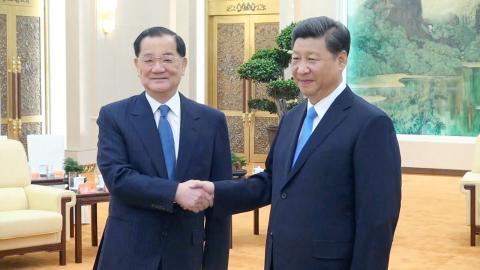It is a historical fact that the then-Chinese Nationalist Party (KMT) government led the war against Japanese aggression from 1937 to 1945, whether on the front lines or behind enemy lines, Presidential Office spokesperson Charles Chen (陳以信) said yesterday.
Chen was responding to remarks by former vice president Lien Chan (連戰), who said during a meeting with Chinese President Xi Jinping (習近平) in Beijing yesterday that the KMT under the leadership of former president Chiang Kai-shek (蔣介石) engaged directly with Japanese troops in major battles, handing the latter a major setback, and that Chinese Communist Party (CCP) troops led by former Chinese leader Mao Zedong (毛澤東) also tied down the enemy behind their lines and eventually defeated the Japanese aggressors.
“The Nationalist forces ... fought a series of decisive and major battles on the front lines and dealt the Japanese military a heavy blow,” Lien told Xi, according to Shanghai news Web site guancha.cn.

Photo: CNA
“The Chinese Communist Party forces led by Mao Zedong effectively pinned down and intercepted the Japanese and the collaborationist militaries on the battlefield behind enemy lines,” added Lien, a former KMT chairman.
Xi said Nationalists and Communists “cooperated and coordinated” in the campaign and that “both made significant contributions to the victory of [the so-called ‘Chinese People’s War of Resistance Against Japanese Aggression and the World Anti-Fascist War’],” China’s Xinhua news agency reported.
“Chinese across the Taiwan Strait must keep history in mind, remember national heroes and become united to savor the fruits of victory and jointly advance the peaceful development of our relations,” Xinhua quoted Xi as saying.
The Presidential Office said that the CCP did little to resist Japanese aggression during the Second Sino-Japanese War.
“Whether it came to engaging in combat with Japanese troops on the front lines or behind enemy lines, it was all led by the Nationalist government, which is a historical fact that cannot be denied,” Chen said.
Chen said that the government’s stance is that “it is inappropriate” for Taiwanese to attend China’s military parade tomorrow — at which Lien is expected to be present.
Beijing has held a series of events to mark the 70th anniversary of the end of World War II, with tomorrow’s military parade considered to be the highlight of the festivities.
The CCP — which defeated the KMT in the Chinese Civil War, forcing the latter to flee to Taiwan — depicts itself as having played the lead role in defeating Japan.
Taiwan said events being held by Beijing distort historical facts, as it was the KMT who fought all the major battles against Japan during an eight-year war before Allied forces intervened.
KMT presidential candidate Hung Hsiu-chu (洪秀柱) yesterday said that she has great respect for Lien, who she said has made significant contributions toward cross-strait peace.
However, Hung added that, given his position, Lien should consider the Taiwanese perspective when making public comments.
Additional reporting by Chang Hsiao-ti

A car bomb killed a senior Russian general in southern Moscow yesterday morning, the latest high-profile army figure to be blown up in a blast that came just hours after Russian and Ukrainian delegates held separate talks in Miami on a plan to end the war. Kyiv has not commented on the incident, but Russian investigators said they were probing whether the blast was “linked” to “Ukrainian special forces.” The attack was similar to other assassinations of generals and pro-war figures that have either been claimed, or are widely believed to have been orchestrated, by Ukraine. Russian Lieutenant General Fanil Sarvarov, 56, head

SAFETY FIRST: Double the number of police were deployed at the Taipei Marathon, while other cities released plans to bolster public event safety Authorities across Taiwan have stepped up security measures ahead of Christmas and New Year events, following a knife and smoke bomb attack in Taipei on Friday that left four people dead and 11 injured. In a bid to prevent potential copycat incidents, police deployments have been expanded for large gatherings, transport hubs, and other crowded public spaces, according to official statements from police and city authorities. Taipei Mayor Chiang Wan-an (蔣萬安) said the city has “comprehensively raised security readiness” in crowded areas, increased police deployments with armed officers, and intensified patrols during weekends and nighttime hours. For large-scale events, security checkpoints and explosives

PUBLIC SAFETY: The premier said that security would be tightened in transport hubs, while President Lai commended the public for their bravery The government is to deploy more police, including rapid response units, in crowded public areas to ensure a swift response to any threats, President William Lai (賴清德) said yesterday after a knife attack killed three people and injured 11 in Taipei the previous day. Lai made the remarks following a briefing by the National Police Agency on the progress of the investigation, saying that the attack underscored the importance of cooperation in public security between the central and local governments. The attack unfolded in the early evening on Friday around Taipei Main Station’s M7 exit and later near the Taipei MRT’s Zhongshan

REBUFFED: In response to Chinese criticism over recent arms sales, Washington urged Beijing to engage in meaningful dialogue instead of threats and intimidation Washington’s long-term commitment to Taiwan would not change, the US Department of State said yesterday, urging Beijing to stop pressuring Taiwan and engage in meaningful bilateral dialogues. The remarks came in response to a backlash from Beijing about Washington’s latest approval of arms sales to Taiwan. The US Defense Security Cooperation Agency said in a statement on Wednesday that the Taipei Economic and Cultural Representative Office in the US has asked to purchase an arms package, including Tactical Mission Network Software; AH-1W helicopter spare and repair parts; M109A7 self-propelled howitzers; HIMARS long range precision strike systems; tube-launched, optically tracked, wire-guided missiles; Javelin